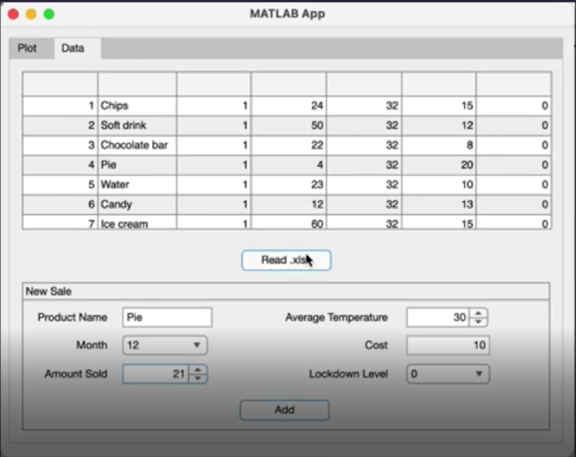Joining us today is a group of students from Stellenbosch University in South Africa. Bianca Harber, Gabrielle Liebenberg, and Rosanne Maritz won first place at MATHack Western Cape 2022 by building a machine learning based application to help small businesses in their community deal with overstocking. Bianca, Gabrielle and Rosanne, over to you…

Inspiration
We were presented with the task of finding a creative way to use MATLAB to help small businesses within the Western Cape during the COVID-19 pandemic. During the lockdowns in South Africa, one of the many problems small businesses faced was what to do with excess stock. We decided to address the root of this issue: why is there excess stock to begin with? This problem inspired us to create a tool for small businesses that will take several data features into account from a dataset of past sales to accurately estimate sales in the future based on locally relevant parameters.
Breaking down the problem
With all the advances in the field, we knew it would be possible to easily make this prediction tool with the use of data science and machine learning methods and algorithms. It was only a matter of finding the right methods for our specific problem.
We knew that we needed to implement a regression algorithm to obtain the predicted output. We selected average monthly weather, price, and lockdown level as our machine learning features, as we thought these would have the biggest effect on sales.
How did we implement it?
We utilised MATLAB’s Regression Learner app to to train multiple regression models, test sample data against these models, and then we selected the model that yielded the most accurate predictions to use in our app. An option to add total sales per product per month, average month temperature and current lockdown level was added to allow the user to generate predictions.
Results
We delivered a minimum viable product that would be able to:
- Import collected data, such as that from a point-of-sale system
- Apply the machine learning model on the data
- Predict future sales based on identified trends
- Allow the user to view these sales predictions by product
The interface for our product, which was easily designed with MATLAB App Designer, is shown below:
The implemented model made sound and accurate predictions, with only a few points of data to work with.
Key Takeaways
Some potential expansions of the product that we thought would be cool to implement were:
- The use of location data (which the MATLAB Mobile application can be used for) to automatically load weather data into the system
- The ability to have this application work on all mobile platforms
- The storage of data in an online database for cross-device synchronization and prevention of data loss
- Automated stock tracking
Through our experience in this hackathon, we really saw the power of MATLAB and its wide range of applications in industry. It was inspiring to see first-hand that you don’t have to be a machine learning expert to implement this tool in a problem you are trying to solve. It was a great opportunity to test our problem solving and creative design skills while attempting to solve a problem faced by real people.


 Cleve’s Corner: Cleve Moler on Mathematics and Computing
Cleve’s Corner: Cleve Moler on Mathematics and Computing The MATLAB Blog
The MATLAB Blog Guy on Simulink
Guy on Simulink MATLAB Community
MATLAB Community Artificial Intelligence
Artificial Intelligence Developer Zone
Developer Zone Stuart’s MATLAB Videos
Stuart’s MATLAB Videos Behind the Headlines
Behind the Headlines File Exchange Pick of the Week
File Exchange Pick of the Week Hans on IoT
Hans on IoT Student Lounge
Student Lounge MATLAB ユーザーコミュニティー
MATLAB ユーザーコミュニティー Startups, Accelerators, & Entrepreneurs
Startups, Accelerators, & Entrepreneurs Autonomous Systems
Autonomous Systems Quantitative Finance
Quantitative Finance MATLAB Graphics and App Building
MATLAB Graphics and App Building









Comments
To leave a comment, please click here to sign in to your MathWorks Account or create a new one.